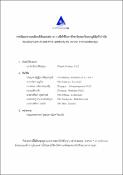บทคัดย่อ
โรคมะเร็งเป็นสาเหตุของการเสียชีวิตหลักในประเทศไทย ซึ่งวิธีการรักษาหลักของโรคมะเร็งนอกจากการผ่าตัด การใช้ยาเคมีบำบัด การฉายแสง และการใช้ฮอร์โมนแล้ว ยังมีการใช้ภูมิคุ้มกันบำบัดซึ่งเป็นอีกวิธีหนึ่งที่มีประสิทธิภาพในการรักษาโดยเฉพาะการใช้ยาในกลุ่มตัวยับยั้งอิมมูนเช็คพอยต์ที่ทำหน้าที่ในการกระตุ้นภูมิคุ้มกันเพื่อให้ T cell ไปต่อสู้กับเซลล์มะเร็ง โดยยาแอนติบอดีต่อ Programmed cell death protein 1 (PD-1) เป็นยาที่ส่งผลยับยั้งอิมมูนเช็คพอยต์ที่มีประสิทธิภาพสูงในการรักษามะเร็งหลากหลายชนิด และได้รับการรับรองจากองค์การอาหารและยา ประเทศสหรัฐอเมริกา เพื่อใช้เป็นยารักษามะเร็งกว่า 30 ชนิด ซึ่งยาดังกล่าวต้องมีการนำเข้าจากต่างประเทศ ส่งผลให้มีราคาแพง รวมถึงผู้ป่วยส่วนใหญ่ไม่สามารถเข้าถึงยานี้ได้ ดังนั้นการพัฒนายาชนิดนี้จึงมีความเร่งด่วน เพื่อให้ผู้ป่วยสามารถเข้าถึงยาที่มีประสิทธิภาพสูงได้มากขึ้น โดยงานวิจัยนี้ได้ประสบความสำเร็จในการพัฒนา humanized anti-PD-1 monoclonal antibody ชนิดใหม่ คือ humanized anti-PD-1 CUSB1936 โดยใช้เทคนิค mouse hybridoma technology ร่วมกับการทำ humanization และทำการวิเคราะห์คุณสมบัติทางเคมีฟิสิกส์ และทางชีวภาพ ผลการทดลองพบว่า humanized anti-PD-1 CUSB1936 สามารถจับกับโปรตีน PD-1 ได้ดี โดยมีค่า KD ในระดับ sub-nanomolar range และสามารถยับยั้งการจับกันระหว่างโปรตีน PD1 และโปรตีน PD-L1 ด้วยค่า EC50 เท่ากับ 375.2 - 613.5 ng/mL นอกจากนี้ humanized anti-PD-1 CUSB1936 ยังสามารถกระตุ้นการทำงานของ T cell ของมนุษย์ให้มีการหลั่งสาร IFN-gamma และ IL-2 ในหลอดทดลองได้เทียบเคียงกับยาแอนติบอดีที่มีใช้ในปัจจุบัน (ยา Keytruda และ Opdivo) และจากการนำยาแอนติบอดีที่ได้จากการผลิตแบบ transient expression โดยใช้ระบบ Expi293 expression system ไปทำการทดสอบความสามารถในการยับยั้งมะเร็งในสัตว์ทดลองโดยใช้หนู human PD-1 knockin mice พบว่า anti-PD-1 CUSB1936 ที่ความเข้มข้น 10 mg/kg มีประสิทธิภาพในการยับยั้งการเจริญเติบโตของก้อนมะเร็งได้ดีที่สุดเมื่อเทียบกับยา Keytruda และ Opdivo ที่ความเข้มข้นเดียวกัน ซึ่งแสดงให้เห็นว่า anti-PD-1 CUSB1936 ที่ทีมวิจัยสามารถพัฒนาได้นั้นมีศักยภาพสูงเหมาะสมในการนำไปพัฒนาต่อเพื่อให้ได้เป็นยาแอนติบอดีต่อ PD-1 ที่สามารถใช้รักษาผู้ป่วยมะเร็งได้ในอนาคต
บทคัดย่อ
Cancer is a major cause of death in Thailand. Apart from surgery, chemotherapy, radiation, and hormonal therapy, cancer immunotherapy became the most promising treatment in the era. Immune checkpoint inhibitors (ICIs) act as immune stimulators to reactivate exhausted T cells to harness cancer cells. Programmed cell death protein 1 (PD-1) is the most potent immune checkpoint molecule, and PD-1-targeted ICIs have been approved by the U.S. FDA for cancer immunotherapy for over 30 indications. In Thailand, ICIs need to be imported for cancer treatment, and the cost of this drug is very expensive, and most cancer patients cannot access this kind of therapy. So, the development of this drug in our country is urgently needed to make it cheaper and increase the chance of patients to access the treatment. This study successfully developed a novel humanized anti-PD-1 monoclonal antibody (humanized anti-PD-1 CUSB1936) using mouse hybridoma technology and characterized its physicochemical and biological properties. The result showed that the humanized anti-PD-1 CUSB1936 could bind to PD-1 protein with high affinity in the sub-nanomolar range and neutralize the PD1/PD-L1 interaction with EC50 values 375.2 - 613.5 ng/mL. In addition, the anti-PD-1 CUSB1936 VH3+VL2 variant could induce T cell activation via IFN-gamma and IL-2 secretion in vitro better than the benchmark antibodies (Keytruda and Opdivo). Then, the anti-PD-1 CUSB1936 VH3+VL2 variant was transiently expressed using the Expi293 expression system. The purified anti-PD-1 CUSB1936 VH3+VL2 variant was then characterized and evaluated in vivo anti-tumor activity in MC38/hPD1 allograft mice model. The results exhibited that the anti-PD-1 CUSB1936 VH3+VL2 variant at 10 mg/kg could significantly inhibit tumor growth compared with IgG antibody control and showed similar antitumor efficacy compared with benchmark antibody. These findings prove that the anti-PD-1 CUSB1936 VH3+VL2 variant exhibits high anti-tumor efficiency and could be further developed as a novel PD-1 targeted ICI in Thailand.


